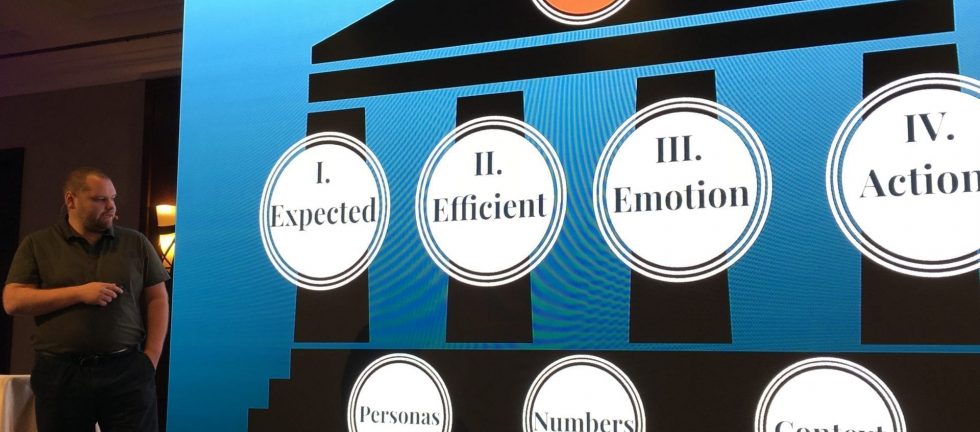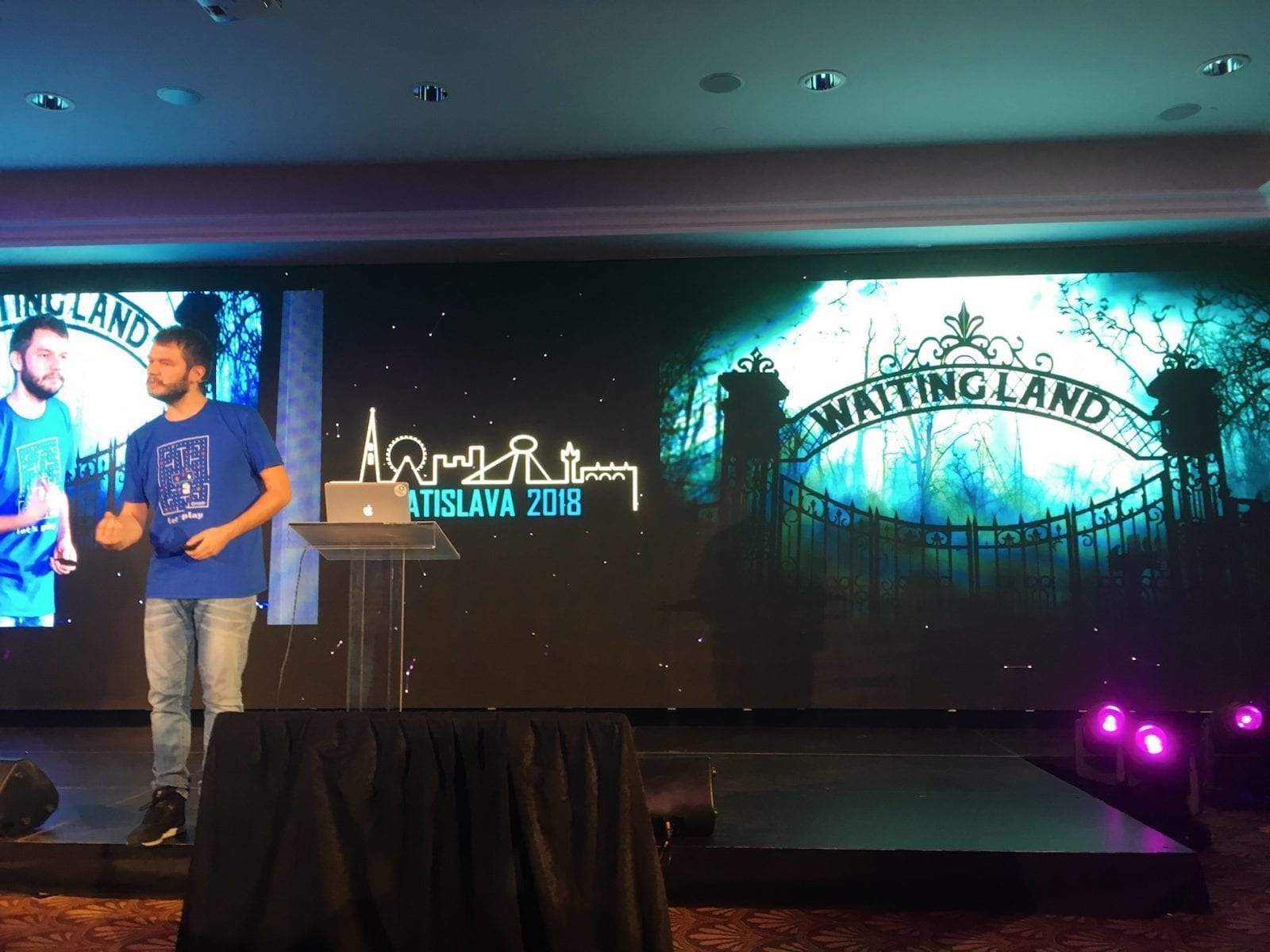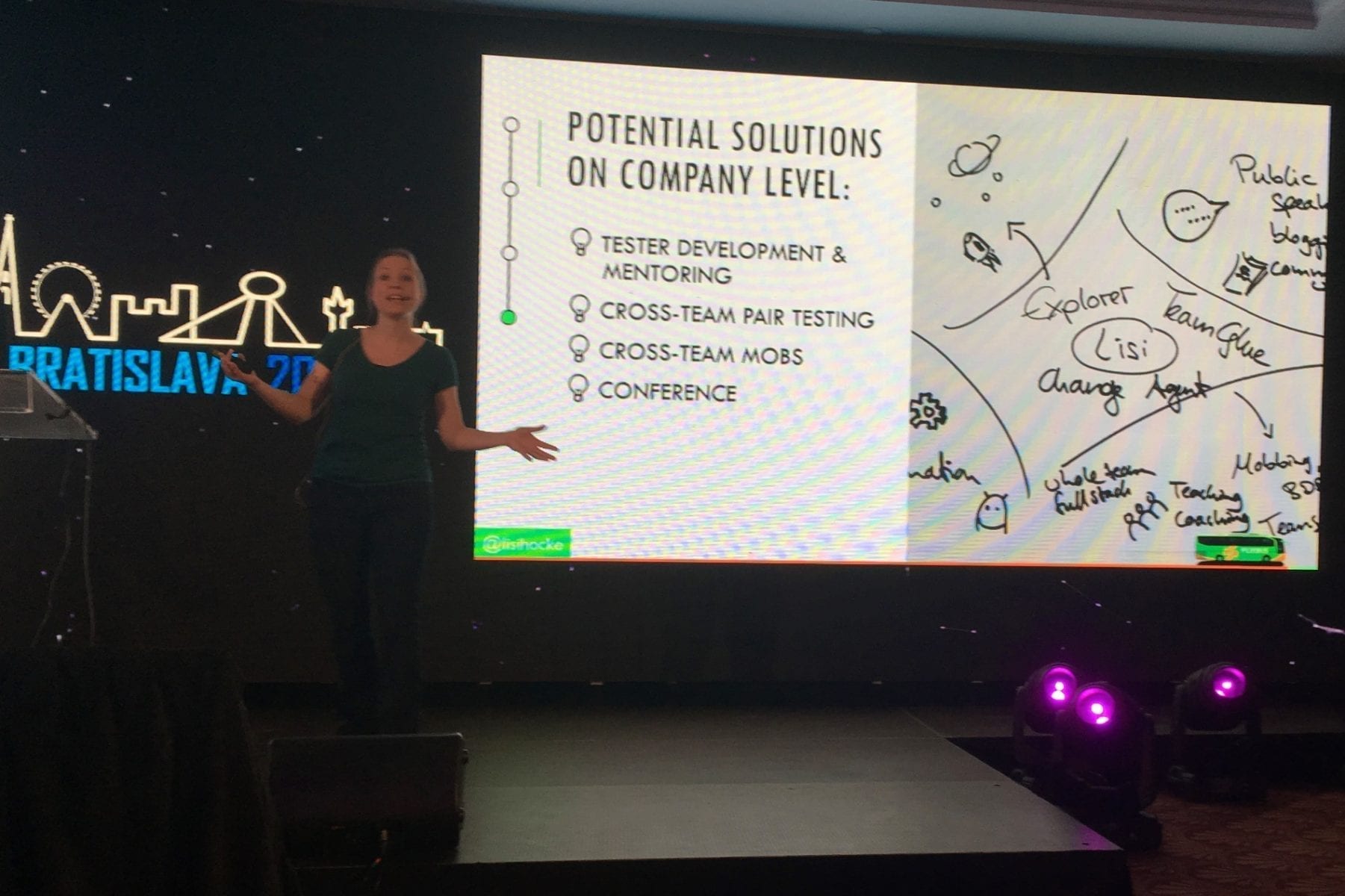Hello,
I am Vojta and I work in Newired as Scrum Master and QA Lead. I like to share my ideas with others in a field of QA and Agile so I travel as a speaker for several conferences every year.
This year, November was a bit crazy for me. I am not sure why, but most of the testing conferences are in autumn. My talks were accepted by two of them, and later I got an invitation to another one, so it ended as following
- Nov 12 – 16 at Eurostar in Hague
- Nov 18 – 20 at Testing United in Bratislava
- Nov 21 – 25 at SQA Days in Moscow
I was a bit scared but at the end I really enjoyed it. Sharing means caring so I would like to share this two weeks with you.
Disclosure: When making notes on conferences I never know later if the note was what the speaker said, or how I interpreted it, or what I felt when he said something else, or just some associations. Please be aware of that when reading my notes.
EUROSTAR
Eurostar was my first conference I ever visited as a participant back in 2011 and I really liked it. I was a newbie in testing at that times and it energized me a lot and was a good motivation.
At 2014 I finally pushed myself to do something with my fear of public speaking and I decided I would like to start speaking at conferences. One of my target that motivated me during this way was “I want to speak on Eurostar”.
Finally, this year, after speaking on more than ten other conferences, I realized this dream. So this one was somehow special for me.
So I need a new target – what about keynote at some conference?
Eurostar 2018 was in Hague. It is a nice city but there are not too many opportunities for any sightseeing. But actually, sometimes it is better because you focus more on the conference and networking.
However, I visited the local pier and beach several times.
Monday
Monday was about full-day tutorials.
TUTORIAL – Analysis for Testers – Michael Bolton
I attended a few keynotes and talks done by Michael, I read some of his books and I like his personality and quite strick way of communication. I do not agree with all of his opinions but his talks always make me think and analyze my thinking and beliefs deeply.
This was the first time Michael did this tutorial so sometimes it was a bit chaotic and there is some place for improvements but I really liked it because it triggered a lot of good questions, discussions, different perspectives, etc.
Here are some ideas I took away
- Things change over time and we often do not realize it soon enough
- Safety speech is an important soft skill and we have to learn it. But I sometimes find it very annoying, especially when used against me.
- Zooming out gives you perspective, zooming in provides details. Tricky thing is to understand what zoom level is your starting point and on what level you are right now.
- “What is” is not guessing. “What will be” is always guess
- Any bug is always about inconsistency
- Feeling during analysis gives it second dimension
- Goals move… Sometimes very quickly…
- We always expect there is a system. We are so desperate to find a pattern. We also often see patterns they are not there just because of our biases
- If you see a pattern you have to assign it a meaning
- We are always analyzing in loops
- We all have our biases. We know about some of them, but others are well hidden.
- There is a time when you switch from “what is it?” to “why is it?” and later to “what is it for me?”
- People always say testers should not make assumptions… bullshits! We have to. But there are different types of assumptions:
- Reckless – avoid them
- Risky – everybody does them
- Safe – we as testers worry about them
- Required – challenge them
- “What is missing?” is the most important heuristic
- Analysis and exploratory testing works the same
- As testers, we are known as the ones who break things, but they are already broken. We break illusions
- Quality is not only absence of bugs it is also the availability of features, on-time delivery, etc.
- Diversity is important. Be different but understand how and who are the others
- An analysis is about breaking things down, but often we have to drill up too
- An analysis is a self-driven activity
- We are expressing ourselves
- Current culture kills motivation to disputation
- Cultivate critical distance eliminate social distance
- Testers are like the opposition in parliament institution
- Changing mindset is huge effort and pain
- When developer tests he does it with a lot of discipline = “are we building what we are building?”
- Ignorance might be good tactics but it is a terrible strategy
- It is hard to critics somebody who is close to you
- It requires a lot of practice to have effective discussion and communication on both sides
- “Just” word should always trigger your perception
- Not everything needs deep testing
- Whenever you feel something strong focus on it. Feelings are so important
- The best tool is pause for decision – zoom in, out, why am I here? Then make the decision
- Bugs emerge
- “Why you have not found that bug?” “Because it was hidden.” so well hidden that even those who put it there were not aware of it.
- We are not preventing bugs, we help to prevent them by pointing on right things and then others will not make those defects.
- Testing is a part of a quality culture
- Do we break the system? How? Drop table… delete Git repository? Or what do you mean by that?
- We are not building the system. We try to help. It is like with driving, there’s only one driver… the system is build be Developers, not by testers
- Is testing manifesto for developers?
- Team responsibility for quality, but what team? Devs and testers? Or also product owner? What about others? Sponsor, customer? HR? Or?
- Look for deep structure
- What is expected as known? Be aware of shadow agreements
- Negotiate semantics in your trading zone.
- Do not over-simplify. Things are sometimes complex… Numbers are often too simple
- Risks
- Evaluating risk as a number is super risky
- Probability is a lot of guessing with some level of ignorance
- If the impact is high, forget about probability…
- For common things, we have enough data, but not everything is common and many things are complex. So that is why we often have no data
- Risk = impact x probability = guess x guess
- A heuristic is not a rule. It can work but might fail
- Risk is an event
- People are not predictable!
- No experience with past can logically be applied into future because we have no experience of future.
- Software is the most fragile thing people ever built
- Ethic and reputation is part of an impact
- Interesting question in impact analysis is “do we even care?”
- The fundamental question to answer ”is there a problem?”
- More bugs you found means less testing you did. Find the important ones at first
- Test to learn instead of to find defects
- We often do not know the requirements until we test it
- Finding bugs turns suspected risks to known risks, also some unknown risks become suspected
- Focus on feelings, intuition, speculations
- We avoid feelings to stay away from troubles, but it can lead us to bigger ones
- The actual bug is only that one which is accepted by the client and that is sometimes hard to evaluate
- Who hired me?
- Most of the people do not like to drive they just want to be somewhere
Tuesday
There was half day tutorial at morning and classic talks started after lunch.
TUTORIAL – When ‘Je Ne Sais Pas’ Is Not An Option – Iris Pinkster-O’Riordain
Tuesday started with half-day workshops and I selected the one about Test Management. It was focused on basics and I did not like it too much. It could be very interesting for newbies in Test Management. However, there were some interesting ideas
- Number of stakeholders is not a problem, diversity is challenging
- Look for reference projects-you are not usually the first one who will ever do it
- Who should I talk to next?
- If I do not know, who knows? And should I even know?
KEYNOTE – Exploring Testing from First Principles – Alan Richardson
Topic and ideas of this keynote were interesting and well chosen as opening one. But I really missed some better visualization and storytelling. The way it was presented was too linear for me.
- Your plan will not survive on the battlefield for a long time. You have to be reactive
- We over-complicate testing
- Description vs. prescription
- Nothing is absolute
- Asking questions is our biggest skill
- Why do you want me to test it?
- Testing does not prove it works. It rather tries to answer the question if we can I trust it.
- Our world explodes by details when our questions are actually answered
- Make a decision what to learn. You do not need to know everything.
- I often ask questions even when I know the answers because I know there could be a different opinion
SPEECH – Competence is About Sharing – Ruud Teunissen
I expected to hear about particular experience and strategies how to effectively share information and knowledge to impact people. However, this talk was more theoretical and focused on the basics.
- Ideas are great, but only when realized
- Heroes are great when they are on the battlefield, but what if they got killed?
- Learn how and why to enjoy what you do
- Never use “you have to” when asking for something
- Something could be nice… but often we do not need it!
- Remain special
- Sharing is caring
- People learn in different ways
- When you ask for the promise you need to believe the promise is real
SPEECH – The Value of Options – Jeffery Campbell
This was a very interesting talk. I really liked it.
- We jump to decisions and doing things too quickly
- If you are talker shut up and let others talk
- We all do not need to agree. You are looking for strong objections
- Stupid ideas are sometimes annoying, but also sometimes they are not so stupid → thinking out of the box
- We all know 5 WHYs, but there are also 5 HOWs
NETWORKING – Test Lab party in Crazy Pianos
Monday party was in a nice club near to the pier called Crazy Pianos. I liked it there, food was delicious, live music was perfect, but it was too loud to have any conversation without risking to lose your voice. That is why I decided to leave quite soon and get some rest before my speech on Wednesday.
Wednesday
Wednesday was opened by four lighting talks and it was a nice idea and kind of interesting way to start a day.
LIGHTINGS
- Jargon is ok but only if you know it
- Airline industry learns from every bug
- If you are lazy you have to be efficient
- “Ready to Test” column could mean you still have very small waterfalls, it depends how short they are! You have to have small stories!
- Fight the good fights, but at first, make your own house clean
- Do not absorb things
- Give a reason to others to change
KEYNOTE – Testing in the Dark – Rob Sabourin
Interesting keynote, very nice ideas, but again the visualization was somehow strange. It did not help to see a logical flow in the presentation and for me, the feeling was something like interesting flashes without clear connections between each other.
- Testing is light in the dark. It depends how good flashlights you have and where you point it to
- Testing is based on trust
- Critical things need to be independent
- People you think as an impedance are often stakeholders
- Is quality really a goal? Cause sometimes such goal is an illusion
- How it was built matters
- Do not focus on details too soon
- There needs to be a strategy to validate the correctness
- Sometimes, instead of finding the correct answer, eliminate wrong ones and the rest is probably correct
- The wisdom of crowds depends on diversity
- Visualize assumptions
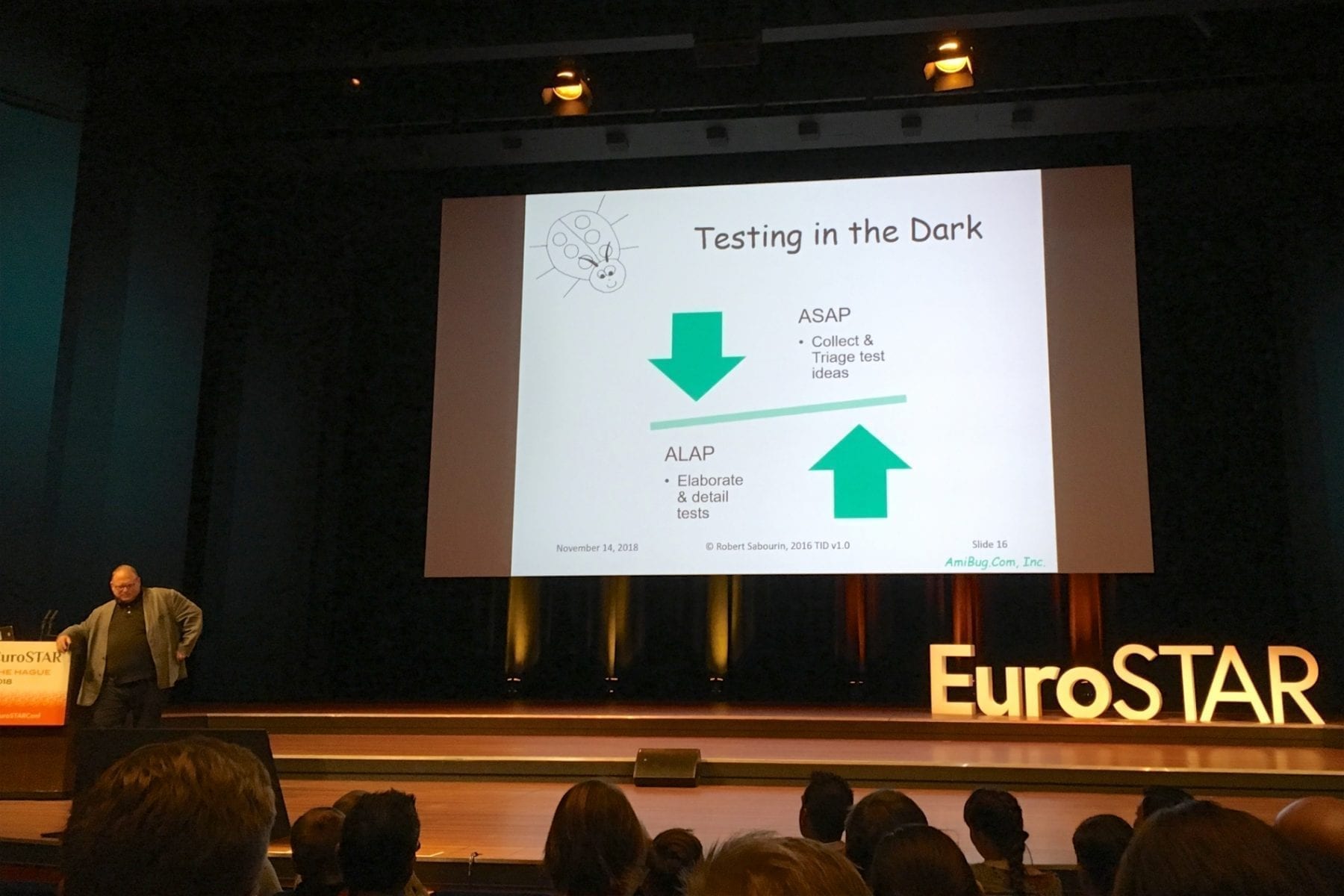
SPEECH – Journey from Rookie Tester to Senior Test Automation Expert – Jani Haapala
I am not an expert in Automation. I know it is important but it was never my piece of cake. That is why I decided to go to this talk. It was interesting to think about the Journey as a game with different levels and beasts to manage. But I am still not sure, if the author really killed them or if they are just stunned and lying somewhere to wake up later. At least that was my feeling.
- Quality of software is quality of life
- The language is never the same
- You are never writing test cases for yourselves, think that somebody else will use it once
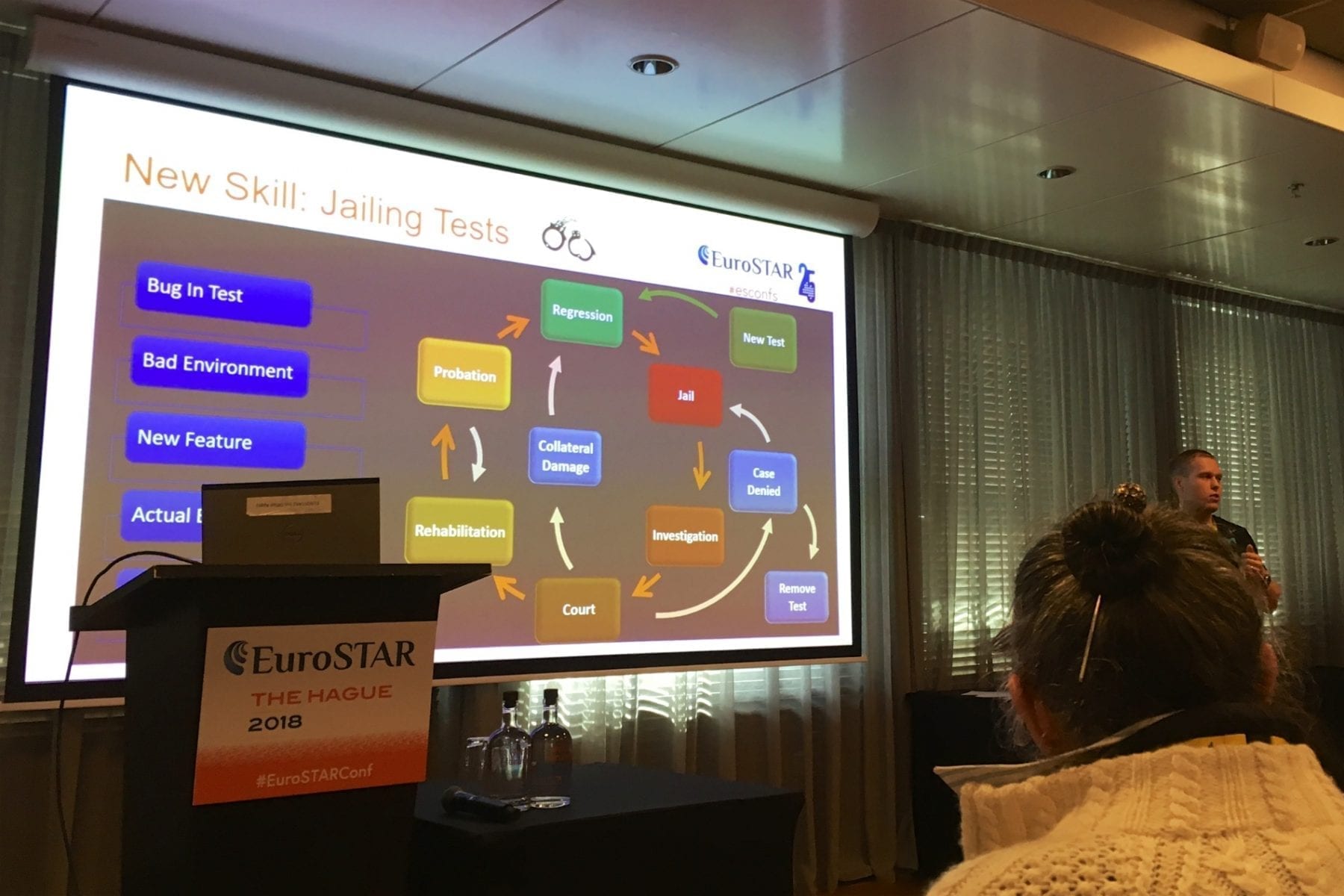
SPEECH – Accepting Ignorance – Patrick Prill
I have not found this talk to be interesting for me
- Where does our knowledge end?
- Even when everybody has a different opinion we are on the same side until the expected impact is similar
- Ignorance is fixable, stupidity is forever
- Why there are no emotions in the knowledge pyramid?
MY TALK – Journey to Effective Reporting – Make an Impact
I enjoyed my talk and I am glad there were several interesting questions and also followups later.
Questions and answers
- Are you preparing different reports about the same thing for different stakeholders?
“Yes, you often have to prepare different reports, but it often differs in details and abstraction level” - How to avoid too many negative emotions?
“Do not try to solve everything at one time. Choose the most important problem, focus on it, propose a realistic solution and when people see it works, next one will be easier” - How to convince people emotions are important and how to trigger emotions when there are no any?
“You have to understand your stakeholders and know what motivates them and how do they react. Positive motivation works better than a negative one. Everybody wants to be proud on his work, especially developers.” - How to report to stakeholders you know very little about or you know do not know at all?
“You cannot report to somebody who you do not know.” - What emotions are better triggers for action, bad or good?
“Bad ones are stronger, but you can easily miss timing. Positive emotions are much better from longer perspective” - Have you done some exercise in your team to understand who we are?
“We played some games to know each other and understand how we communicate, etc.”
SPEECH – Doubt Builds Trust – Elizabeth Zagroba
I had huge expectations from this talk because I love this topic, but I was disappointed. It was very basic and a bit chaotic.
- Judging is natural
- Safety language in interviews is tricky
- Use some application with a lot of defects during an interview
KEYNOTE – How our differences make all the difference and what to do about it – Syllyann Freudenberg
This was one of the best keynotes I have ever heard and only this one was worthy to go to Eurostar. Syllyann is autistic lady working in IT for a very long time and she shared with us the experience of being different and why the diversity is so important and necessary
- IT is creative industry, not artistic, but very creative
- Personas are like imaginary friends
- Our mind needs time to make a connections = incubation
- There are no deadlines, there are sadlines – if not met nobody dies, but somebody will be sad
- Disabilities are possibilities if you understand them
- What is your superpower? Special interest?
- We are all somehow weird
- Use technology to help us but make it simple
- Diversity makes all the difference
- Biases → human are so broken
- We focus on differences too much
- You should learn to think slowly
- Knowing how to shut up is an expert skill
NETWORKING – Awards Dinner
Perfect food, nice discussions and I also found a few other participants from the Czech Republic. I enjoyed this evening and it was very nice.
Thursday
Last day of the conference was very relaxing for me because I already did my talk
KEYNOTE – The Dragons of the Unknown – James Christie
I have some mixed feelings about this one. There were interesting ideas but somehow hidden and for me, it was very hard to keep focused
- Some parts of the system are too different and you have to reduce or manage that differences
- All systems are broken but often valuable
- Large systems usually operate in failure mode
- When auditing system you really do not need requirements, at least not at the start. You are evaluating the current system
- Making it more complex makes it easier to fail
- We still do not know how to automate the majority of things
- We make more and more mistakes because we do more and more complex work
- Human error is not result, but cause
- System behavior cannot be described as a behavior of its components
- If you think something does not feel right do not do it, even when you do not know why “pilot sometimes not taking off because of just feeling something is not right”
SPEECH – An Influential and Charismatic Tester, Really? – Tim Koomen
Very nice topic, well presented and excellent speaker technique. This should be a keynote.
OBLIGATION
- Even if you do not want to (often)
- Give → Relieve → Pay back
- Break this circle
- Time, help, advise
COMMITMENT AND CONSISTENCY
- The more effort first stop takes stronger commitment is
SOCIAL PROOF
- Do what group does
- Involve influential people
- Majority thinking
SCARCITY
- Potential loss wins against the potential gain
SYMPATHY and LIKENESS
- We are associated with bad news
AUTHORITY
- knows more, can reward
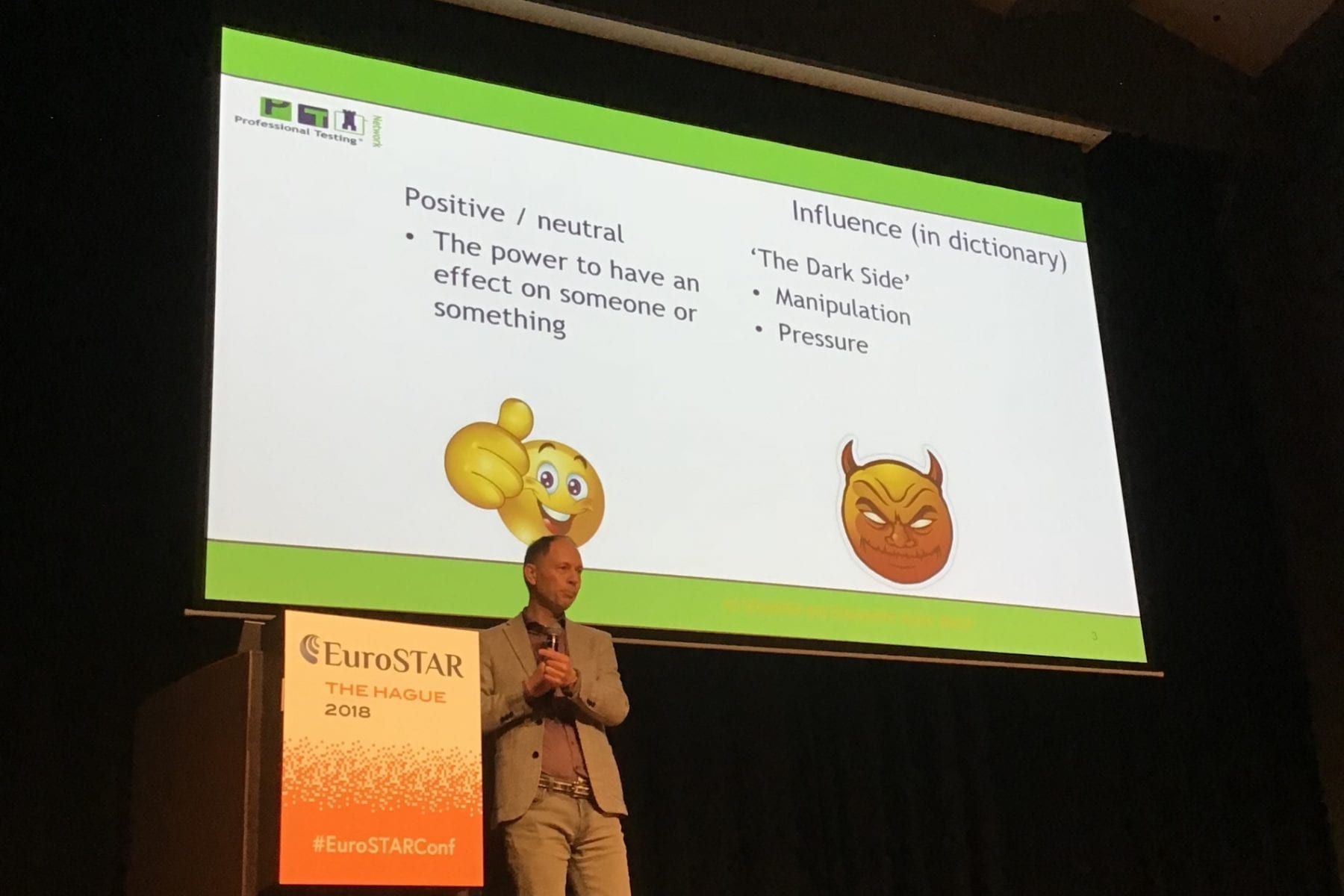
KEYNOTE – What Is Your Overall Career Goal? – Karen N. Johnson
This was a well-selected closing keynote. Everybody should really think what is his goal and what he would like to achieve and if you want to do something big you need a lot of time.
SPEECH – Higher-Value Checking – Michael Bolton
A lot of information, very quick, may be too much…
- Checking is based on an algorithm. Of course, it is part of testing but it is not testing
- The spelling checker is a perfect example of automation, people can do it, but why should they?
- Machines do not have intentions
- Products are bad or not-known-to-be-bed-yet, the building could be on fire but we do not know yet because alarms are not working
- The green glow of automation is like narcotics
- Do testing to learn at first, later to find problems
- It is not always good thing machines can do things people can’t do
- UI cannot be tested by a tool as good as by human
- There is a huge temptation to have passed tests
- If you need to add waits to automation you probably found a performance problem

TESTING UNITED
I spent one day at home and I went for the next conference on Sunday – Testing United in Bratislava. I am really glad there was a testing conference in our region again and I was pleased to be invited to its first year.
Hotel was located on the main square and Christmas market was just there. Very nice atmosphere.

Monday
KEYNOTE – QA of Future – Tomasz Dubikowski
Opening keynote was performed by energic Tomasz Dubikowski and I really enjoyed it. It was kind of typical opening one, but well presented and I agree with its vision
- The future is never bright in movies
- Today’s hot topics in the future will become a commodity
- People get used to things pretty quickly
- Start being proud about testing
- Quality is not simple
- Who is in charge of your carrier you or your company?
- Are you growing yourself or do you grow your company?
- Recruitments are like sales, do not trust them
- People die during the waiting
KEYNOTE – Next Stop Flixbus – Lisi Hocke
It was a nice change of rhythm. After very energic Tomasz Lisi was very calm and the topic was more about presence than about future.
- Flixbus owns only 1 Bus = tech and service company
- Acquisition often triggers a lot of culture problems
- Political = against walls
- Automation frees us for more interesting things
- Good agreements often do not work due to bottlenecks (people, environments….)
- Stop starting, start finishing.
- Can I just help by doing nothing giving others time to get in pace?
- Knowledge silos are still a very frequent problem
- MOB on demand
- If idea should be proven it should be implemented by somebody else if possible
- The side effect of Mob is pairing
- Think about something is not enough you have to realize it
SPEECH – Rediscover Exploratory Testing – Ingo Philipp
In my opinion, this was probably the best speech of the conference. Well presented, perfect slides and I really enjoyed it.
- Grow knowledge you have about your software cause it is also still growing
- Quality is subjective
- A bug is something that bugs somebody (J.Bach)
SPEECH – Insecure by design – Tomasz Konieczny
I did not like this one. Firstly, the speaker was extremely shy, but that would not matter if the talk is interesting. But this one was not. Scratching the surface, no detailed information, without offering any possible solutions or own opinion about what to do to improve. Questions at the end were not well answered.
- Security always has also non-technical aspects
- We often do not even think about the fact we are connected to the network
- Your network is as secure as the less secure connected thing
- Updating software of older items can be problematic
- It could be hard to avoid a single point of failure
SPEECH – The Multidisciplinary Test Engineer – Is that a future necessity? – Alon Linetzki
I heard much better talks from Alon. In my opinion, this one was kind of too general and theoretical. Very slow start focusing on foundations. I was sitting far away from slides and it was very hard to read them and there was a lot of text.
- Start with the end in your mind
- Domain knowledge is hard to gain so we often stay in the same domain forever
- Technologies are commodities
- The world is changing from” testers” to “testing”
KEYNOTE – Better Test Design to Increase Test Effectiveness & Efficiency – Ceren Şahin Gebizli
I am not sure what this keynote was about. It was presented in a challenging way for people who do not have good knowledge in this domain. I tried my best but I was so confused as most of the others.
NETWORKING
Hotel was in the city center, just 10 minutes walk from the castle. It was a nice to walk there.
I went to bed pretty soon knowing my speech is in the morning.
Tuesday
KEYNOTE – Five key challenges for software quality tomorrow – Gojko Adzic
Gojko is a great speaker, I enjoyed this one, but I had to leave at a half to prepare for mine presentation
- Algorithms become users of our software but we do not have good heuristics for that
- Most problems in cloud happen after deployment and often after some time
MINE SPEECH – Effective Reporting
I presented the same talk as on Eurostar (as requested by the program committee) and it went very well. I had a lot of questions and several people asked me if I can do the same presentation in their company. It looks like a topic of not effective reporting and emotions is problematic everywhere.
PANEL DISCUSSION
Panel discussions can be either very good or very bad. This one was very good. It was well organized when questions were asked via conference app and discussion was well moderated. Good job!
- Testing will take whatever a shape (T, Pi)
- There will not be green or red. Cause we will not be able to answer it in a simple way
- There will be a lot of suits people blaming the software for damage = “who is responsible?”
- Is tester responsible for not finding the bug, or developer who implemented it, or who is?
- Math, electric, chemistry, psychology skills are more and more important in a world of software and there are not there
- Everybody wants to be a manager
- The market is looking for the craft
- Message in marketing about testing is it is easy. Do you want good money? Just join IT as a tester…
- Admit it “bug hunting” is sometimes a lot of fun
- Gojko: “I am ok to suffer through testing because I hate maintenance more than bug fixing
- Testing afterward does not make sense in AI and machine learning. It is too late and does not provide answers we need
- Best learning technique is teaching
- Watch some video from any conference together with your team and discuss it!
- Early adopters are not skeptics. Their feedback could be false positive.

KEYNOTE – Testing in the digital age: AI makes the difference – Tom Van de Ven
This is how talk about the future should look like because there was a very clear connection with presence and well presented
- Number of information is growing and predictions become more important
- Prediction always have some time frame, longer means less precise
- Acceptance and end to end testing are like a crash test because you need a complete car. But a lot of tests are done before crash tests
- There is reasonable probability Al will give you different answer today and tomorrow, so is there even the right answer?
- Build a defect detector – but you need a lot of data for analysis
- It is hard to get data from videos
SPEECH – Automation – the Good, the Bad and the Ugly – Raluca Marariu
This was not my piece of cake. I am not automation guy but I expected this one to be more like lessons learned. However, in my opinion, this was quite unstructured and I am not sure what was the main message.
SPEECH – Will Agile kill off the Test Managers? – Richard Taylor
This is so frequent topic on many conferences that I start to think something is wrong with us. Moreover, every talk is the same – no, we will not die, but we have to change and we will be needed on large scaled Agile projects. But I would expect some new perspective on this topic, something like a cookbook. I can imagine this talk was interesting for newbies or somebody who never thought about such a topic.
Nicely presented.
SUMMARY
I enjoyed it. Networking was special because there were a lot of participants from Czech or Slovak and it is always different when you can use your native language.
It was the first year of the conference and it was well organized so great job. See you next year.
SQA DAYS 24 – MOSCOW
I had a few hours with my family and I was leaving for my last conference this year – SQA Days in Moscow.
I like SQA Days because it is kind of relaxing conference for me. There are always some old friends speaking and I make new ones every year.
This year I planned to have a workshop on Agile Drawing but there is a saying “the man means the lord changes” so you never know. It is nice how things have sometimes immediate impact (not as in our software world). I injured my right hand during traveling to Moscow so having a workshop about drawing was mission impossible. That is why it is so important to always have Plan B – mine one was to do the same speech as on Eurostar and Testing United. There was only one small problem, that speech was designed for 45 mins and workshop was planned for 1,5 hours. It was great fun to double it in only one day and also visiting some other interesting talks and do some sightseeing… But I managed it.
SIGHTSEEING
Moscow is a very interesting town and it was not so cold this year (-5 Celsius) so I walked a lot around Red Square and its surroundings.
SPEECH – From Quality assurance to Quality Assitance – Gojko Adzic
It was interesting to see Gojko speaking a bit slowly giving the translator some time to translate. Very good talk
- If there is no tester everybody tests. When he joins the team over time all testing become his responsibility and that is so wrong and it leads to lower quality
- We are quality assistants
- If you are selling your software 500k Eur per single copy as we did in the 80s you can do whatever in QA cause you have money and time to do that
- The 90s where years of testers – even Microsoft had ratio 1:1
- Later it changed from being good to being cheap and we started saying “us and them”
- We recognized testing is also slow so big boom of automation started and we traped ourself in a way
- But it was still slow so now we finally recognize testing should be shared a responsibility and it should be more like an activity instead of a job description
- Why testers do not trust developers to execute tests? There are not stupid… it is stupid bias and organization problem
- Digital tools are easy to hide things. Visualize it – sometimes it is a good idea to print 300 red cards with defects and put them everywhere in your office
- Propose small reversible experiments
- Teach people to ask better questions
- Describe only ideas how you would test and what types of bugs you would expect and then let developers write test and execute them
- Define questions checklist devs can ask to tester – they cannot ask anything else (1. What to test? 2. I tested X should I test something more? 3. Can you help me please?)
- Feedback exercise – ask for an opinion from others, compare emerged answers and questions
- Cross-functional tools are good glue and interface to promote collaboration
- Let people experience the failure and unexpected results
- Whenever you test have Dev tools opened
- Risk storming – imagine this feature is broken, what does it mean and how to mitigate it
- Eat dog food
- Evidence vs. Confidence – there is a huge difference
- Reduce testing fraction pain
- Testing will never ever be as important as development. You can do dev without testing, you cannot test without dev
- Introduce control points
- Bug review and cause analysis to find out how to prevent them
- Every customer email should be treated as a problem. Why the hell they had to contact us? What do they miss?
- Testing tours (Book: How Google tests?)
- Waste snake = what people think they should not be doing. Visualize wasting
- Tool: bug magnet chrome extension
- Speed up spreading of ideas
- Do not fix people tests fix the process they create them
- Fix It days – focus on fixing important but not critical bugs
- Mike Bland – Rainbow of death model
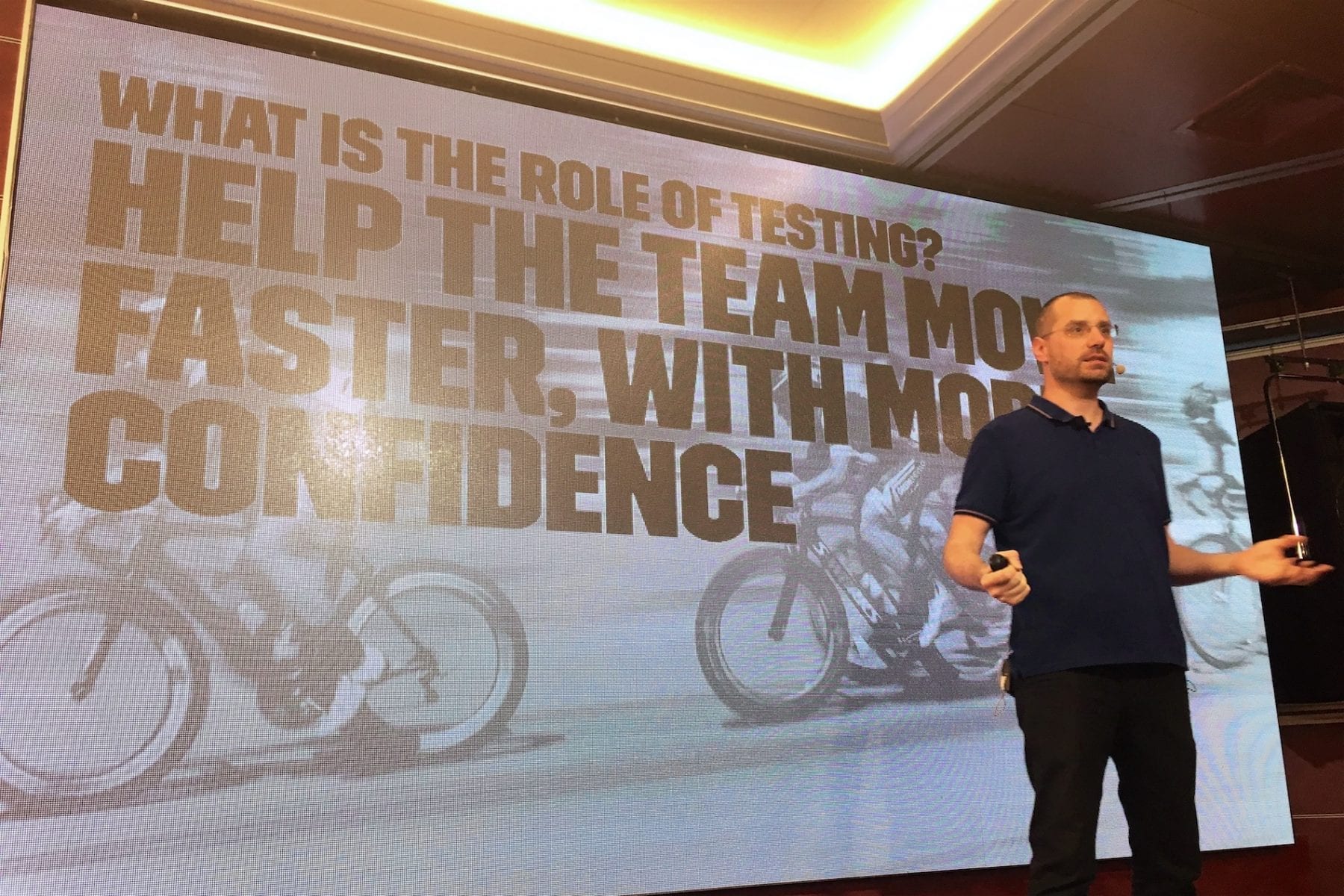
SPEECH – Shift Left – testing in the land of acronyms – Michael Pilaeten
As always, Michael, well done, good slides, I liked it
- Continuous everything is the key
- Dev Ops is as old wine bottles in new bags
- Cost of defects in Waterfall and Agile is the same
- False sense of security is more expensive than testing at the end
- Building a system based only on requirements is like asking your wife if you can go partying while she is sleeping
- We have to document a lot to avoid missing information later
- TDD objective is clean code (red, green, refactor)
- Shifting left is for an entire organization
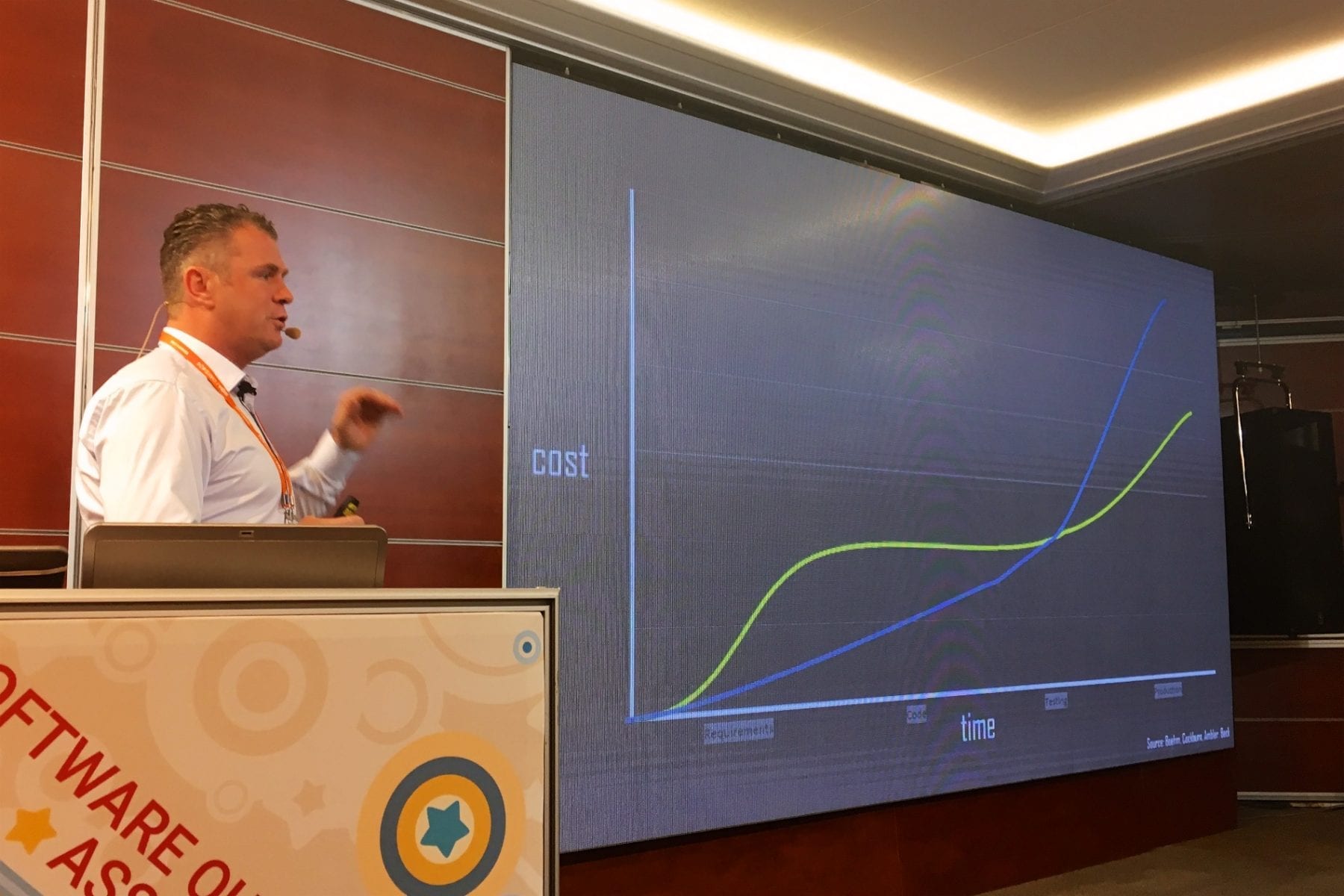
SPEECH – Testing in Production – Gojko Adzic
The second speech from Gojko was not so interesting for me as the first one.
- Testing in production is a necessity in cloud
- Major risks are now testable only after deployment
- Focus on trends, periodic patterns, etc.
- Analyze if a behavior is unusual
- Plan and test behavior change
- 25% users block cookies. You should at least notice users it could be a problem
- If a percentage of error change get alert
- You have to separate signal from noise
- Look for log anomalies and monitor them
- Logs should be testable
SPEECH – Rice in the eye – Marcin Sikorski
Marcin was speaking well, slides were nice, but I do not like his opinion that we have to change if we want to work with China. I understand we have to understand them and they will become global in the future, but for me, that is a bit moral and ethical dilemma.
- There is always a strong or weak position in the negotiation in China. Nothing in the middle
SPEECH – AI and Testing – Vipul Kocher
Very interesting talk an introduction to AI. Unfortunately, I was working on my slides during this one, so I was not taking notes. Video from this talk would be perfect for somebody who needs an introduction to this area – kind of teaser to trigger interest.
- Often we know something is wrong but we do not know why yet, we do not know what rule was broken
SPEECH – AI: The future of testing – Johan Steyn
Having two talks about AI in a row was not probably a good idea due to overlaps but Johan had a bit different perspective so not a big problem.
- Selling services is selling trust
- If there is no electricity for next year most of us will die. In a few years, the same dependency will be on AI
- Who is your customer? Have you actually met them
MY TALK
As I said, it was the third time I was giving this talk, but this time I had to extend it to 1,5 hour. I added a lot of examples and checklists. Also, I focused more on a different approach to different stakeholders and their need to have a different level of details and abstractions.
I enjoyed it, there were many questions. Also, I saw one big difference – people in Russia think they should not aim to trigger emotions in managers, customers, etc. And there is still that Dev vs. QA attitude very often.
Questions:
- How to make developers to feel the same?
“Developers are proud people. Challenge them if they are proud about their code. What if the code would be open source? Also, nobody likes bug fixing” - How to do different reports with different details with less effort?
“Prepare all information you need and then present them in different abstraction. Always start with a conclusion and provide a map how to find more details when needed. But it is an investment.” - Can we also deliver good news and trigger positive emotions?
“Of course, there are plenty of good things we should report about. Appraise people whenever you can.” - What if we are in the situation when negative emotion was not addressed and now it is too big it gonna explode?
“Do not postpone things. Bad news are better when delivered sooner. But in this case – let it explode.” - Do we want to trigger emotion also in high management?
“You have to, but be careful… Most importantly – never lie or polish things”
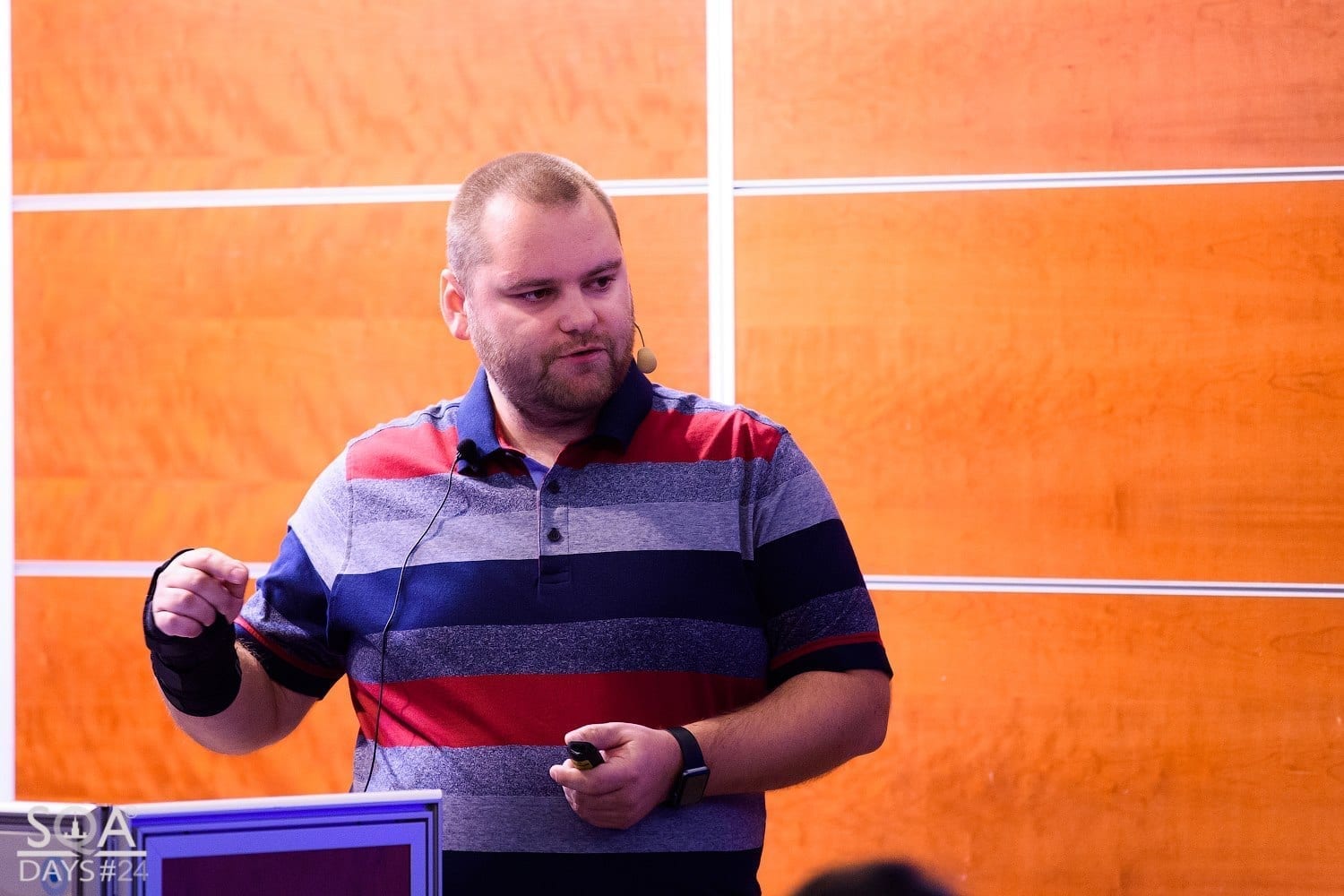
ROUNDTABLE – Karolina Zmitrowicz, Hans van Loenhoud, Vojtěch Barta
I joined roundtable with Karolina and Hans on the topic of “Managing Quality in IT – Testing is not enough”. It was an interesting experience, a good discussion.
However, I think this should be more organized by a moderator to be more effective. Without a moderator, it tends to be a bit chaotic. Also if you want to have three people talking all of them should have a microphone.
The general feeling after this roundtable was that people know “testing is not enough” but it is quite hard for them to formulate it and some formalization and process are missing.
NETWORKING
We enjoyed a party and later a nice dinner with other speakers having excellent sushi.
BIG SUMMARY
If I should summarise that two weeks I would say the following
- AI and Machine Learning are hot topics and they will change our ways of testing significantly, but I think it is not coming in the next few years. However, we have to start learning now.
- Everybody has to understand the difference between validation and verification, or if you want, between testing and checking.
- Everybody has to define and work on his craft – be whatever shape you want but know why, how and have that skills and master them.
Few personal things
- I feel more and more that is very hard to combine roles of a tester with roles like customer care, scrum master or product owner. It is a different mindset, tools, way of working and doing both can be tricky because it could lead to a lot of compromises on both sides. You have to be super careful and you have to always know what hat you are wearing just now.
- With AI and Machine Learning evolving and being more and more realistic I feel much stronger my area of development should focus more on people, happiness, soft skills, etc. I think this will become even more important when dealing with new things emerging in the future.
At the end, I would like to thank to
- My wife – she makes it possible for me to travel and speak on conferences
- My company for supporting me in these activities
- All programme committees for selecting my talks
- All people who organize conferences
- And all people who visit these conferences to learn and share
See you somewhere next year.


